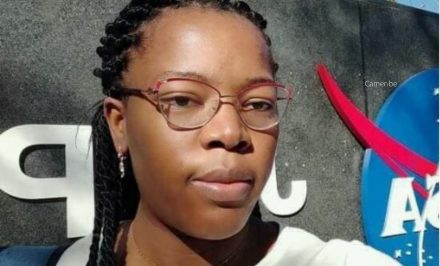 Cameroon : Dr. Yasmine Ndassa, the research scientist turned data storyteller
Cameroon : Dr. Yasmine Ndassa, the research scientist turned data storyteller
 Julien Ngum Che : advocating for the rights of displaced women and youth in Cameroon
Julien Ngum Che : advocating for the rights of displaced women and youth in Cameroon
 Chilufya Mutale Mwila, the Zambian entrepreneur driving financial inclusion across Africa
Chilufya Mutale Mwila, the Zambian entrepreneur driving financial inclusion across Africa
 Wangari Muchiri, the Kenyan engineer committed to accelerating the ecological transition in Africa
Wangari Muchiri, the Kenyan engineer committed to accelerating the ecological transition in Africa


Babette Christelle Tchonang is a Cameroonian physics researcher. She has just joined the small circle of African women scientists working at the National Aeronautics and Space Administration (NASA). In February 2022, she integrated the Jet Propulsion Laboratory (JPL) where, as an oceanography specialist, she will study the expansion of water on the planet Earth from a satellite as part of the search for solutions against climate change.
At less than 30 years old, Babette Tchonang is one of the elite of African scientists working in the American agency. A specialist in oceanography, she is expected to put her expertise at the service of NASA’s efforts to find solutions aimed at solving the effects of climate change.
It is at the University of Dschang, in the west of Cameroon, that she began her studies in physics in 2011 and obtained three years later, a bachelor degree. She then specialized in environmental physics at the University of Yaoundé 1 and completed a master 1 from 2014 to 2015. In 2015, the young student joined the University Paul Sabatier Toulouse III in France for a master 2 in physical oceanography and worked, in particular, on the exchange of passive tracers between the surface and subsurface of the Gulf of Mexico. This was followed by a training in 2016 in Germany at the Center for Polar and Marine Research of the Alfred Wegener Institute. As part of this independent project, she conducted a year-long research on the “seasonal influx of deep warm water into the continental shelf of the Filchner Ronne ice shelf.”
Climate change: bringing her expertise in oceanography to NASA JPL
In 2017, at the University Paul Sabatier Toulouse III, she conducted her doctoral research in operational oceanography. For three years, she focused her research, particularly on the contribution of the SWOT (Surface Water Ocean Topography) satellite to ocean analysis and forecasting. A subject of particular interest to NASA, since the future SWOT mission is being developed as part of a collaboration between the French National Space Research Center (CNES) and NASA. “The main objective of my research is to test innovative SWOT and data assimilation techniques and to quantify the impact of SWOT for ocean analysis and forecasting. The second objective is to analyze and better understand the predictability of the ocean at the meso and sub-meso scales”, she confides on her Linkedin page.
This February, she was recruited at NASA JPL. She will participate in the efforts of the American agency in the search for solutions to climate challenges, one of the main consequences of which is the occupation of space by ocean waters on the surface of the earth. As an oceanographer, she will help measure the expansion of these waters via the SWOT satellite, which can observe up to 15,000 km.
Although she carries out her research in Europe and the United States, Babette Christelle Tchonang’s ambition is to contribute through her research to the sustainable management of coastal zones in Africa, particularly in the countries of the Gulf of Guinea (Côte d’Ivoire, Ghana, Togo, Benin, Nigeria, Cameroon, Equatorial Guinea and Gabon).